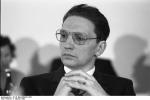
The distinguished theologian Wolfhart Pannenberg died on September 5, 2014, at the age of 85, according to his former student Philip Clayton, posting at the Theoblogy blog (September 7, 2014). Often described, as Clayton says, as "the greatest theologian of the second half of the 20th century," Pannenberg's wide interests included the relationship of science and religion. His writings on the topic include Wissenschaftstheorie und Theologie (1973; translated as Theology and the Philosophy of Science, 1976) and the papers collected in Toward a Theology of Nature: Essays on Science and Faith (1993) — named as a central text of the discipline by the International Society for Science and Religion — and Historicity of Nature: Essays on Science and Theology (2007).
To the extent that Pannenberg was interested in the creationism/evolution controversy in the United States, he was dismissive of both the scientific and the theological legitimacy of creationism. In "Human Life: Creation versus Evolution?" (1998), for example, he wrote, "the theory of evolution still provides the most plausible interpretation of what is known about the history of organic life on this planet." Acknowledging that "the modern picture of nature ... is ... at variance with the image in the first chapter of Genesis that the whole order of creation was produced in six days and continues to exist unchanged," he insisted that the Bible also represents creation as a continuing process. "Such a conception of continuous creation does not have difficulties with a doctrine of evolution, according to which the different species of animals emerge successively in the long process of life's history on earth." Similarly, in a 2001 interview, Pannenberg recommended, "In criticizing the doctrine of evolution, our creationist friends among Christian theologians should read their Bibles more closely." In the same interview, he described himself, not as a theistic evolutionist, but as a Trinitarian evolutionist.
Pannenberg was born in Stettin, Germany (now Szczecin, Poland), on October 2, 1928. He attended the Universities of Berlin, Göttingen, Basel (where he studied under Karl Barth), and Heidelberg from 1947 to 1953, receiving his Th.D. from the University of Heidelberg in 1953. He served as professor of systematic theology at the University of Heidelberg from 1955 to 1958, at the Kirchliche Hochschule Wuppertal from 1958 to 1961, the University of Mainz from 1961 to 1967, and the University of Munich from 1967 until his retirement in 1993. He was a visiting professor at the University of Chicago, Harvard University, and the Claremont School of Theology. He received honorary degrees from the Universities of Glasgow, Manchester, and Dublin.
